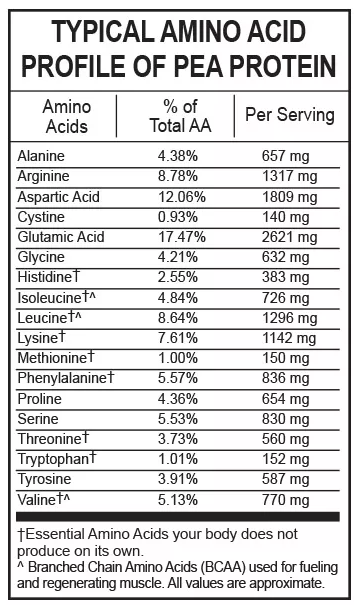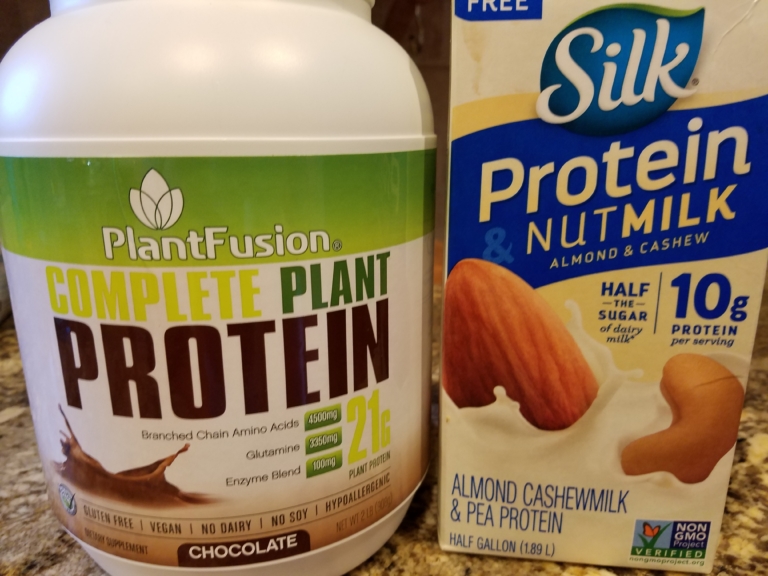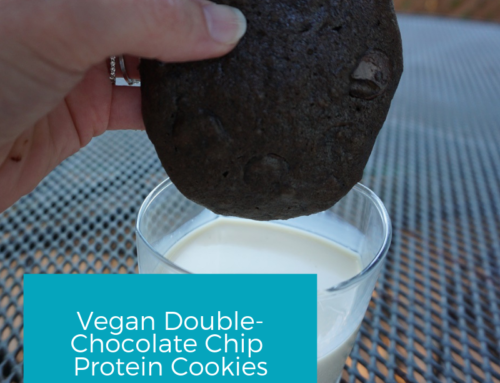My husband is an avid bike rider. He is also dairy intolerant and needs plant-based protein sources. Several years ago it wasn’t as easy to find plant-based protein powders and milks. But now, peas are highly popular. And for many athletes, finding quality sources of plant protein is helpful to their athletic performance. So I spent a little time looking at pea protein. What is pea protein and what are the benefits for everyday athletes?
What is Pea Protein?
Pea protein is more or less what it sounds like: protein extracted from peas.
Protein isolate is obtained by drying and grounding peas into a fine flour. Then, it gets mixed with water to create a paste. After the pea paste gets dried, it gets ground into a fine powder, creating pea protein isolate. This product gets used in powders and milk replacement drinks.
Pea Protein Nutrition Facts
In a 30-gram serving, pea protein isolate provides the following nutrition:
- 100 calories
- 23 grams of protein
- 7 grams carbohydrate
- 0.3 grams fat
- 6 grams fiber
- 400 IU vitamin D
- 5 IU vitamin E
- 200 IU vitamin A
Peas are Packed Full of Nutrients
Pea protein isolate is an good source of fiber, providing 6 g total fiber. The current recommendations for fiber for women is 25 grams for women and for men is 38 grams for men, until you reach the age of 50 when fiber needs for women drop to 21 grams and 30 grams for men. Who knew peas could help keep your digestive system running smoothly?
Along with fiber, peas are an excellent source of iron, zinc, potassium, vitamin K, vitamin B6 and B2, niacin, and folate. Iron, vitamin B6 and B2 all play a significant role in protein metabolism. And niacin and the B vitamins help convert food into energy. Along with the benefits that you get from these vitamins and minerals, peas provide phytochemicals, including coumestrol, saponins, phenolic acids, and flavonoids. There’s some research that suggests phytochemicals may reduce your risk of developing certain cancers.
Is Pea Protein a Complete Protein Source?
A complete protein contains all of the essential amino acids. Amino acids are the building blocks of protein and our body needs 21 of them to continue to function. Nine of the 21 have to be obtained from food sources, and are considered essential amino acids.
If a food source has all nine essential amino acids, it’s called a “complete” protein. Animal protein, like dairy and meat, are rich in all nine essential amino acids. Plant protein sources tend to have lower amounts of certain essential amino acids. And researchers at MIT reported that all vegetable proteins contain all essential amino acids.
Many plant protein sources are less rich in specific amino acids. Pea protein isolate contains all nine essential amino acids, but is a poor source of methionine. Luckily, for everyday athletes it’s easy to get methionine by including small amounts of rice protein.
It’s no longer believed that you have to consume complete proteins in one meal but instead you can consume a variety of food sources throughout the day to meet your protein requirements.
Branched-Chain Amino Acids in Pea Protein
Branched-chain amino acids (BCAAs) are really helpful for athletes to maintain and build muscle. The trio of BCAAs include valine, leucine, and isoleucine.
Here’s the amino acid profile for pea protein:

Whey protein, found in milk and a very common type of protein in powders contains 10-11% leucine by weight. Comparable to whey, this protein contains about 9% leucine by weight.
Environmental Benefits of Harvesting Peas
Peas place less stress on the environment. One reason is the plant’s ability to fix nitrogen in the soil reduces the need for nitrogen fertilizer. And their shallow root system doesn’t require large amounts of water to grow.

Can you build muscle with pea protein?
A study published in the Journal of International Society of Sports Nutrition concluded that pea protein supplementation promoted a greater increase of muscle thickness as compared to the placebo, especially for those that were beginner weight lifters. Further, researchers found there no difference in muscle growth for the pea protein group compared to the group with whey supplementation.
As a high-protein food source, 92% of the calories comes from protein, another reason pea protein helps you build and retain muscle.
Another benefit for pea protein is how slow it moves through the stomach. It aggregates in the stomach, making you feel full longer. Some research has also shown slow-digesting protein may be more effective at building muscle due to our body’s metabolic response to carbohydrates and proteins.
Our Favorite Pea Protein Sources
There are several different protein powders that use pea protein. Our favorite has been PlantFusion Complete Plant Protein. And our favorite dairy-replacement milk is by Silk called Protein Nut Milk. The milk isn’t always easy to find so when we do I stock up.

Pea Protein Benefits for Athletes
Pea protein provides several benefits for athletes:
- A plant protein that is mostly protein by weight.
- Something that can help you feel full.
- A food good for the digestive system.
- A complete protein with all essential amino acids.
- We think it tastes pleasant.
What’s your take on pea protein? Have anything else you’d like to share? Let me know in the comments below!
You may also be interested in this previous post on the power of plant based protein.






Leave A Comment